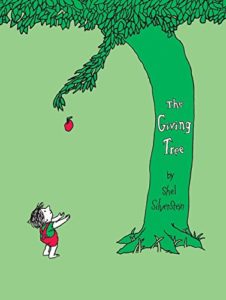Reviewed by John Z. Upjohn, USMC (Aspired)
The so-called Social Justice Warriors always say they want strong female characters and realistic role models for women but they once again prove that SJWs always lie by ignoring this book, which provides the most complex, intricate, and yet startlingly true-to-life depictions of females of any book I have read or will ever read.
The Giving Tree is the story of a real man, a red pill-downing alpha male who knows the importance of maintaining frame and consistently demonstrating value to any tree he wants to fuck by being confident and taking what he wants, then leaving her alone so that she knows his time is valuable and that he is not to be trifled with. This pleases her because as a female tree it is her biological imperative to find a male with a high sexual value. It is so refreshing to finally see a believable depiction of a woman like this.
The tree supports her man through all his endeavors. Whether he is working hard to sell apples, harvest lumber, building a house, or cutting down the tree to make a boat to get away from the shrew of a wife and the children she no doubt conceived to entrap him into marriage, she leaves him alone to get on with the hard work and the sacrifices he makes to achieve his dreams.
As vivid a portrait of the female psyche as the tree paints, though, it is the man’s wife who steals the show. She is first deftly foreshadowed when the man shows up at the tree explaining to her his plans to build a house. Why does he need a house? So he can have a wife and a family. This is the moment when we know our hero has slipped into blue pill thinking. When he was a child, before our female-dominated society had filled him with its propaganda, he was happy doing nothing more than going from tree to tree and having his fun with each one, keeping many plates spinning in the air, but when he grew up he drank the Kool-Aid and believed he had to settle down with any woman wily enough to steal his sperm.
And the wife. The story brings her to life in nightmarish detail. Overbearing, emasculating, controlling, frigid, and ugly but with an inflated sense of her own value given to her by feminism and its lies. The book almost spends too much time and detail making you picture her, and his life with her. You can’t get away from her.
Or can you?
Because our hero turns it around. He realizes he’s had enough, and he goes his own way. He takes the red pill. With nothing but his own two hands and the sweat of his brow, he makes a boat out of the tree and he sails away and we never have to see his wife disgrace the page again.
As satisfying as his escape from the clutches of her tyranny is, it’s almost too little, too late to save the book. She had too much of a presence in the book to begin with. The story is not about her, it’s about him. Why did they have to interrupt the fascinating story of this man in order to focus on her?
The ending of the book is a complete letdown, when the man who had gone his own way before comes back and settles down with the used-up old stump of a tree. Why? A man of his proven sexual value should never have to settle for a woman his own age unless he wants to, at which point there’s no reason for him to not keep a dozen or more plates spinning because men of his value become even more rare with age. This is the point where the book goes from grounded, realistic depictions of female existence into a flight of pure fairy tale fantasy, and it is the point where I check out.
Using strong, fully-developed female characters with personalities deeper and realer than I assume most actual women have and a classic tale of red pill redemption to sucker the reader in and then deliver this ending is such a classic example of SJW-style entryism that Saul Alinsky himself might have penned it.
Two stars.
Note from Alexandra: If you enjoy my coverage of the Sad Puppies and related nonsense, satirical and otherwise, please help me get to WorldCon 74 in Kansas City. For every $150 I collect towards my goal of $1,800, I will write another piece similar to this one.

